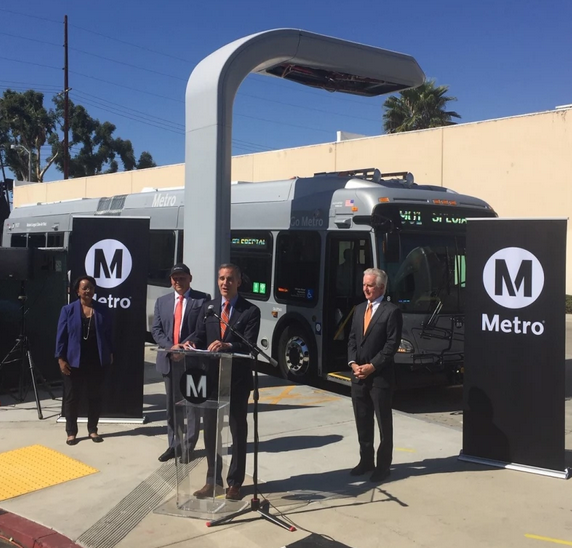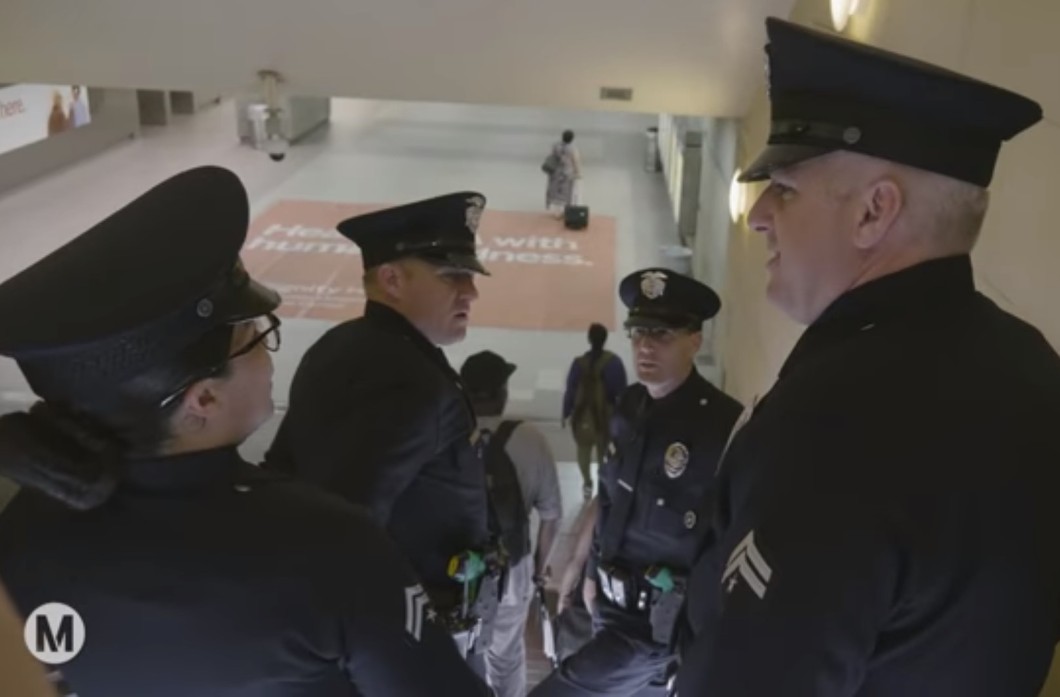At a press event this afternoon, Metro leadership celebrated the agency having fully converted the Metro G (Orange) Line to battery electric buses.
Initially scheduled to be all-electric by the end of June 2020, Metro premiered its initial G Line electric buses a year late in late July 2020. The G Line Bus Rapid Transit (BRT) has been running all-electric since June or July 2021. Streetsblog covered Metro's announcement at the time; the accomplishment didn't make Metro's The Source blog, but appeared as a small blurb on Metro's service changes pamphlet. Streetsblog has been critical of Metro's reluctance to promote its own electric bus achievements, so today's event was one worthwhile step in that direction.
L.A. Mayor and Metro boardmember Eric Garcetti, long a booster of electric vehicles, touted the G Line buses "smooth quiet ride" especially compared to Metro's relatively loud compressed natural gas (CNG) fleet. Boardmember Ara Najarian noted that the G Line is an important test bed for Metro's "truly electric" future. City Councilmember Paul Krekorian touted the broad range of electric buses - from reducing greenhouse gas emissions to reducing noise and other pollution for riders and surrounding neighborhoods. Metro CEO Stephanie Wiggins highlighted the equity benefits of G Line electrification, with more than 50 percent of G Line stations serving equity-focused communities.
Some recent press has noted some growing pains at Southern California transit agencies that were early adopters of battery-electric bus technology. Today, Wiggins stated that Metro has not encountered these sorts of reliability problems on its G Line buses, which are manufactured by New Flyer. Wiggins praised Metro's "great relationship" with the manufacturer, stating that these buses have met Metro's high standards. Najarian noted that the G Line electric buses are performing well, after already having logged more than 900,000 miles.
The next steps toward Metro's 2030 deadline full bus fleet electrification remain murky.
In 2020, Metro applied for a California Transit and Intercity Rail Capital Program (TIRCP) grant for $105 million worth of electric buses and charging infrastructure, but the application was not funded.
Metro initially funded two initial funded electric pilot lines - the G and J (Silver) BRT Lines. The G Line pilot, explained above, was completed a year late. The J Line, when approved in 2017, was scheduled to be completed by June 2021. Today Wiggins announced that, based on the Metro's board's June 2021 approval of an additional $50 million for retooling planned J Line charging infrastructure, the line is now expected to be running electric buses "in two years." That would put the line two and half years behind schedule.
Instead of moving forward with more actual bus electrification, Metro has retooled its electrification schedule to make the curve steeper in later years. In some cases, Metro's staff reports already point to a two-year delay, with full bus electrification pushed back to 2032.
Today, several speakers asserted that the future schedule for Metro bus electrification is dependent on outside funding. The most likely source would be federal electric transit funding, which is currently wrapped up in federal infrastructure and transportation bill negotiations. Metro's sales tax revenue make it among the most well-funded transit agencies in the U.S.; if the political will was there, Metro could shift existing funds toward expanding bus electrification instead of continuing to extend contracts for new CNG buses.
Metro staff are dragging their heels and quietly delivering modest electrification pilots behind schedule. The board's most prominent electric vehicle supporter Garcetti has one foot out the door. It is not clear where the leadership will come from for Metro to start taking bus electrification seriously.






